Stellaris Review – Paradox conquers outer space
The long-awaited Stellaris has taken over the universe… and Steam. Devs from Paradox have created an amazing space 4X game. And despite some shortcomings, it’s hard not to get hooked on it.
The review is based on the PC version.
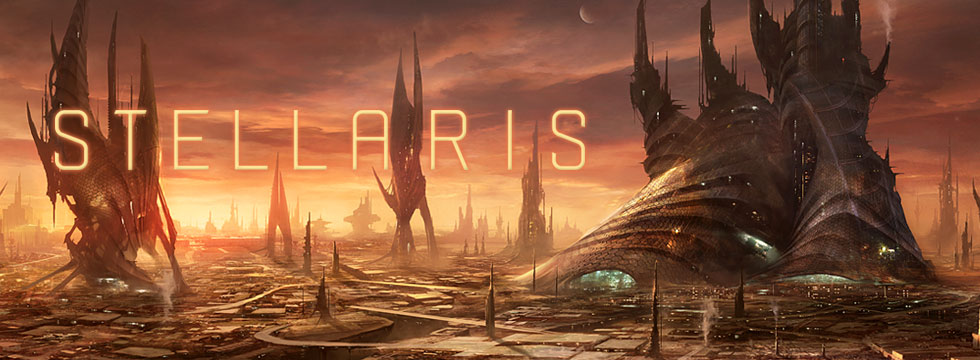
- Sucks you in and doesn’t let go;
- Plot developed using randomly generated events;
- Handy and simple interface;
- The exploration is very satisfying;
- Powerful race maker;
- Climatic, Interstellar-inspired music;
- Meticulously implemented visuals.
- The middle phase of the game has moments where nothing happens;
- Could use more content (e.g. espionage) and polishing of several elements;
- On normal difficulty the AI is passive;
- On launch – optimization issues on large maps.
Space has fascinated people for ages. Bookstore shelves are groaning under the weight of science fiction novels and Hollywood releases adaptations of SF classics on a daily basis. Who knows, maybe thanks to Elon Musk and his company SpaceX voyages through space will soon become reality. For now, we have dreams, books... and video games.
Stellaris is the latest work from Paradox. This time the Swedish devs, known for their elaborate strategy games, have ventured onto uncharted waters. By employing their rich experience and well-proved solutions, they have created a terrific 4X space strategy. It is not perfect, but knowing the developers' habits and the ingenuity of the modding community, any deficiencies it may have will soon be a thing of the past. And then... be prepared to pull some all-nighters, because even as it is now Stellaris is a black vortex capable of devouring any amount of free time you can spare!
The Paradox of grand strategies

The Swedish studio Paradox Interactive is well-known throughout Europe. They won the hearts of players thanks to the historical strategy game franchise – Europa Universalis – which surprised them with its scale, realism and abundance of options. Gamers loved those sandboxes for allowing them to participate in great wars and events of the past, as well as alter the course of history. The EU series in turn spawned Crusader Kings, a sub-franchise focused on diplomacy, dynasties and lineages; the developers didn't shy away from modern settings as well, creating the Hearts of Iron series. Paradox aptly described their productions as "grand strategy games", which accurately conveys their enormous scale.
Stellaris is the first futuristic strategy in the Swedes' portfolio. Paradox did not, however, abandon their tradition; on the contrary, they have put to work all of their experience gathered up to this point, creating a product that will instantly feel familiar to the lovers of the studio's previous works. The main difference is the addition of exploration, thanks to which we get a full-fledged 4X experience (so far, Paradox's grand strategy games lacked the exploration aspect per se).
Children of the stars
To begin, Stellaris requires us to create a race. The choices we make when picking traits, ethics or political system of our species are very important, as they have a substantial impact on the course of gameplay. For example, if we choose to play as a race of spiritual xenophiles, we will be unable to benefit from slave labor. An important distinguishing factor between various races is also the way they travel through the galaxy: there are three different methods, and each has its pros, cons, and unique characteristics. The fact that we create our own race also goes rather well with the randomly generated gameplay. This time when designing the game, the Swedes were not bound by any historical realities, so each time we get a different map, different competition and different neighbors. Even the scientific discoveries are random to a certain degree, and we can never be sure in which direction our civilization is heading and where it will get us. It's that element of unpredictability, characteristic of the games from Paradox, which – while certainly reduced – wasn't completely eradicated. And rightly so.
What I love about Stellaris is the early phase of each scenario. We start on our home planet, but pretty soon we begin exploring and colonizing nearby celestial bodies – at first only those that have the climate suitable for our subjects (or citizens), but over time, scientific discoveries allow colonization and terraforming of hostile environments. So far the games from Paradox didn’t particularly emphasize the aspect of exploration (although, e.g. the colonization of the New World in Europa Universalis had it to some extent). In Stellaris, especially at the beginning, exploration plays a big role and is actually quite fun. It enables us to get to know the nearby planetary systems, giving us access to their resources. But that’s not all; while we're there, we can also discover various anomalies, each of them a small history in itself – sometimes even the equivalent of RPG quests, urging us to choose one of several options the consequences of which can be significant. That's how we get to know the galaxy's past, which is quite remarkable and in line with the hard sci-fi nature of the setting. It also shows that while Paradox abandoned the realistic historical settings, it retained its scientific approach to the contents of its games.
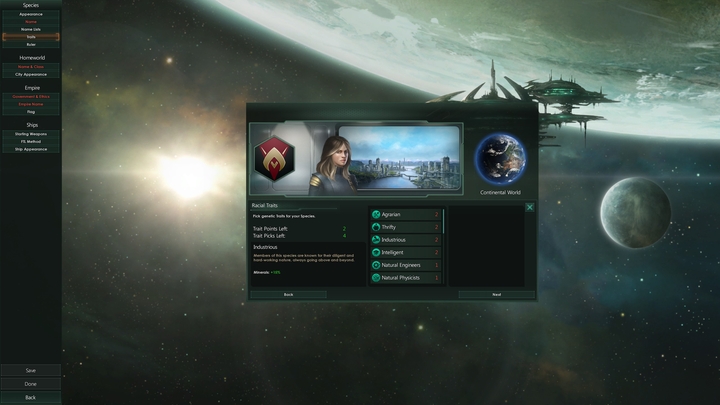
The Final Frontier
Eventually, our empire reaches the point where it can no longer develop freely – other, competing civilizations appear in close proximity to our borders. That is when the game reaches its middle phase. From that moment on the diplomacy, initially not very important, becomes crucial. At this point, we get relieved of personally managing our planets – like in Crusader Kings, there is a limit to the number of worlds we can administer from our capital, and if we go over that limit, we will be severely punished. The solution is to create sectors, administrative units that can incorporate numerous celestial bodies and are managed automatically. Our role is limited to appointing an administrator and choosing the general direction of development (e.g., scientific research or crystal mining). That’s how the tedious micromanagement of individual planets was minimized – and at a certain stage there are dozens of them on the galaxy map.

In Stellaris management takes place on two levels: galactic and planetary. The latter allows us to construct buildings and guide the population like we do in another work from Paradox – Victoria – or, for a more popular example, in the Civilization series. These two types of management differ significantly, but they complement each other very well.
As we slowly approach the final phase of the game, we clash with other civilizations (and/or form federations with them), colonize other planets, and face various galactic crises. Among the latter, we have things like, for example, AI uprisings (in an obvious, and first of many, reference to the TV series Battlestar Galactica) or internal struggles with various factions forming within our empire. Those include mainly conquered races, but also cases like separatists from planets on the fringes of the empire. This problem can be dealt with in numerous ways, one of them being what I did in my aggressive empire – enslavement of all new residents??. Unfortunately, this decision came with certain consequences – chains and shackles do little to promote intellectual growth, so at some point my fungoid overseers fell behind other civilizations in terms of technology... The premise of the faction system is wildly entertaining, but it's a pity that it doesn’t put up the player against a harder challenge.
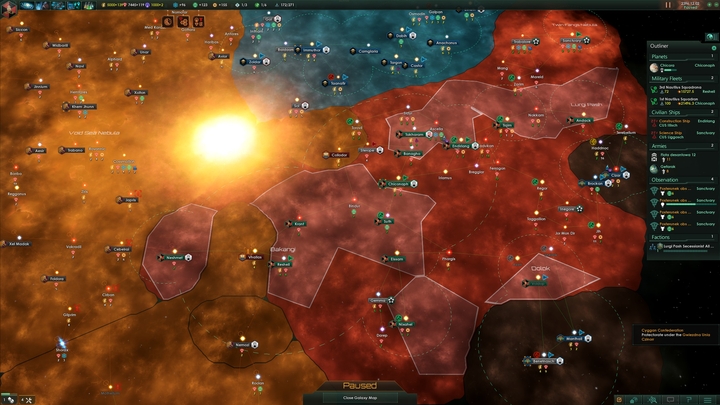
There are several traits that set Stellaris apart from a typical 4X strategy. The game doesn’t feature a turn-based system, an aspect of mechanics typical of the genre, and the gameplay – just like in Europa Universalis – is a strategic sandbox, in which we are expected to set our own goals to some extent. The final phase of the game also plays an important role; that's when we have to deal with various large-scale crises – be it the emergence of “Skynet” or the “Reaper” invasion.
A bit of RPG
As befits a game by Paradox, Stellaris – thanks to a system of random events – features a certain degree of unpredictability, thus creating all sorts of stories. Some of them are told by ourselves, as we act out our in-universe role. One of my gameplays featured a decade-long competition I had with two other, similarly advanced empires. Unfortunately, my opponents decided to get along and formed an alliance, putting me in a rather dangerous (or at least uncomfortable) position. I spent dozens of in-game years secretly preparing for a devastating, aggressive blitz while currying favors on the surface as I didn’t want them to launch the first strike. They didn't. "The Zerg" did – we received an information that an unknown destructive force was approaching our galaxy (this is one of the final phase events). Fortunately, the horde appeared behind one of the competing empires – so I took advantage of the moment and drove a knife into my neighbor's back. I promptly ignored the desperate calls for galactic unity in the face of a common threat, vassalized what I could and... quickly succumbed to the terrifying monsters from the abyss myself. Despite the defeat I actually felt a bitter-sweet satisfaction – I adopted the attitude of my civilization (fungoid drivers of millions of slaves) and acted as they would have in that situation.
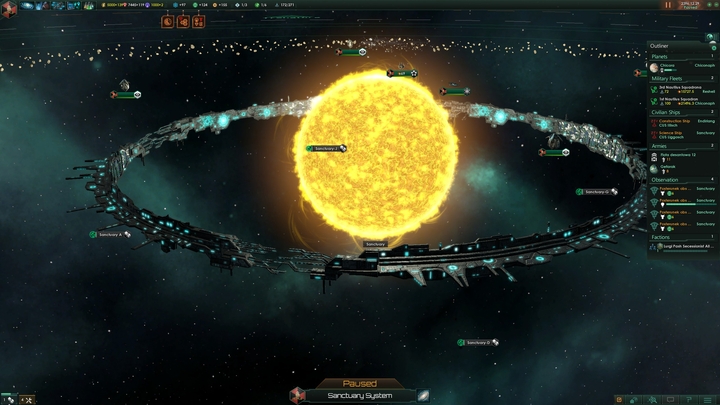
There are hundreds, if not thousands of such stories in Stellaris. Some other time, while playing as a peace-loving human civilization, I built an observation post on a planet inhabited by a rather primitive species. After several years of passive observation, a scandal erupted – a group of scientists had secretly gone planetside, became local “deities”, and ordered the natives to build a great pyramid. The outpost had to be shut down – given the ethics of my civilization there was no other choice. The same thing happened when I was playing as reptilian xenophobes – this time I could take advantage of the deification of my scientists and keep tabs the situation. As a result, a large-scale religious war broke out, and a large part of the planet's population was lost in the following massacres. And I suspect that there are several other, different solutions to this event still waiting to be discovered.

Stellaris is a game by Paradox, a studio somewhat infamous for its tradition of releasing unpolished titles. For some time now, however, the Swedes have been working to change that image, and their new strategy game is a proof that they are making progress. On the day of release – which the creators admitted themselves – the main problem was the game's stuttering on large maps in the later stages of the game. According to the developers the problem will soon be dealt with. Besides, while it may be irritating, it hasn’t prevented anybody from playing.
Galactic red tape
It is almost ironic that the biggest issue I have with Stellaris is that, for a game in which AI can rebel against their creators, the AI-controlled enemies turn out to be rather passive. I have spent a few dozen hours playing the game. During all this time, guess how many times a competing empire declared war on my state? Only once. Such passivity has its advantages (undisturbed expansion in the early stage is not something to be sneezed at), but if you want to deal with the punishing nature characteristic of other works by Paradox (e.g. vassal uprising, reversal of alliances, or sudden loss of hard-earned stability), you should begin on a higher difficulty level from the start. Let's add to that the fact that it is sometimes difficult to make a pact, and in the middle phase of the game we get fewer anomalies and, consequently, ensuing events, which translates to periods where pretty much nothing happens. Our sectors manage themselves, peaceful civilizations do not want to enter alliances aimed against our enemies, and all the interesting events of the early phase have already taken place. That's when the diversity is provided by galactic crises – in my opinion, however, there are too few of them in the current version. I should also note that the issue plagues mainly the larger maps – it wasn't as obvious on the smaller ones.
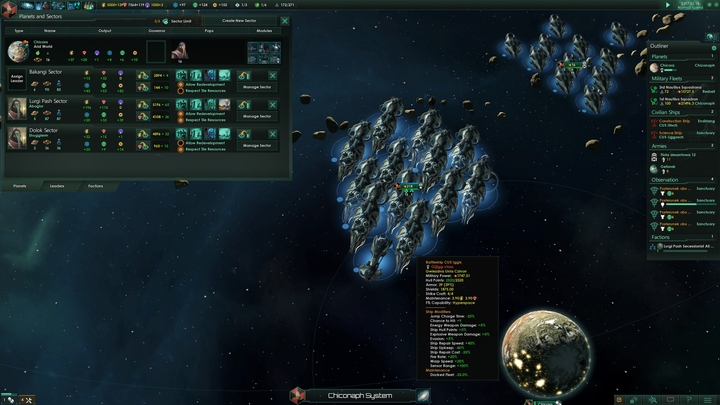
The games from Paradox are known for the fact that in version 1.0 they are like a skeleton – complete, but could use some fleshing out. It is no different with Stellaris. Even now, this space 4X can provide dozens of hours of fun, but the game certainly could use more content. Beginning with expanded diplomacy options, through greater diversity in the middle phase, to additional depth in the faction system (not once have they caused me a serious problem). I would also like to see espionage playing a bigger role, which would perfectly match the mechanics of the middle and late phase of the game.
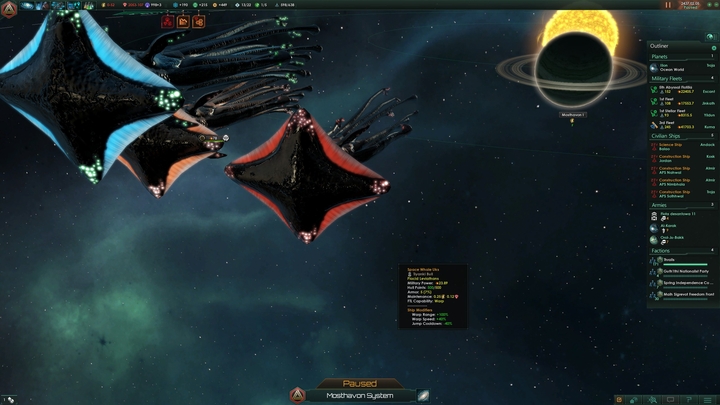
Stellaris also needs to polish several important elements. Apart from the aforementioned passive AI, the in-game notifications could definitely use an overhaul. We can’t freely modify them as in other Paradox titles, which leads to unavoidable overflows (e.g. during a war), when we get buried under such amounts of data that we are unable to efficiently review them. One other thing that is missing is the cross-sectional data analysis – I almost can't believe this to be the work of Paradox! As a result, we often have to dig through successive planetary systems or menu screens to reach the relevant information (e.g. if a civilization is in possession of one of the rare resources). Said sector system does indeed subtract a lot of unnecessary micromanagement, but it is not perfect – we still need to manually supervise each space station, and the sheer volume of events makes it easy to lose track of things such as a colony ship.
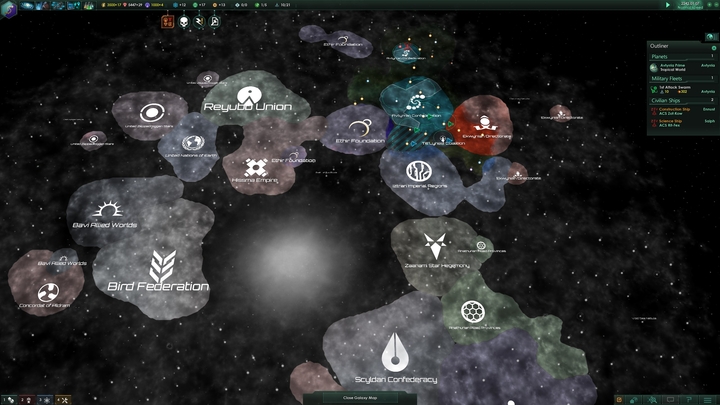
A strategy all the way
I'll be honest with you – for a long time I wasn’t sure how to rate Stellaris. On the one hand, this 4X space strategy has the pull of a black hole and the ingenuity of one of Elon Musk's visions. I've spent some prime time with it and I know that I will be back for more. In addition, this production can boast some very climatic music, similar to Interstellar (cosmic electro, perfect when reading SF literature – tested it myself!), and colorful visuals with a mass of details visible in the close-ups. Stellaris is also a testament to the fact that the Swedish company is successfully working towards making their grand strategy games more user-friendly, which is a good sign in the context of the upcoming Hearts of Iron IV. A nice example is the spacecraft design tool – we can create our ships ourselves or rely on the automatics, which works quite decent as well.
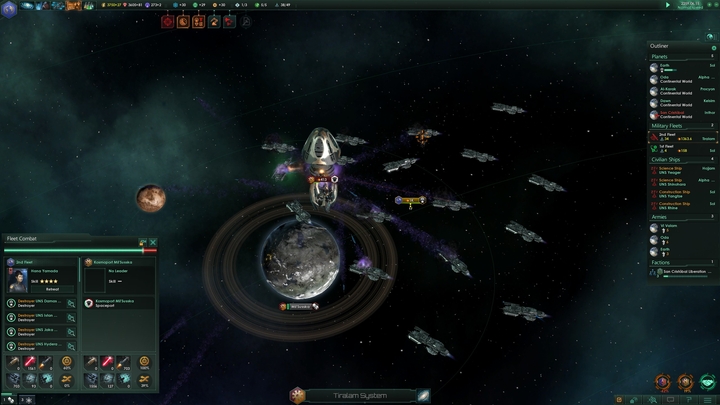
On the other hand, Stellaris is also a game with several shortcomings, the most painful being the passivity of AI and the fact that we get bored during the middle phase of the game. While it is true that the first drawback will be eliminated, to some extent, by a well-organized multiplayer, that's not the point here. I am positive, however, that the game's drawbacks will be dealt with – knowing Paradox's policy, we can expect a considerable number of paid expansions, not to mention complex fan modifications. So here I was, wondering about giving the game an 8; what eventually tipped the scales in its favor was the fact that Stellaris, even with all of the aforementioned shortcomings, is just an insanely fun and cool game. And after the developers eliminate the imperfections and expand the title with more content, we will get a truly grand space strategy. Then you can easily add one more point to my current score.
Stellaris
Stellaris Review – Paradox conquers outer space
The long-awaited Stellaris has taken over the universe… and Steam. Devs from Paradox have created an amazing space 4X game. And despite some shortcomings, it’s hard not to get hooked on it.

